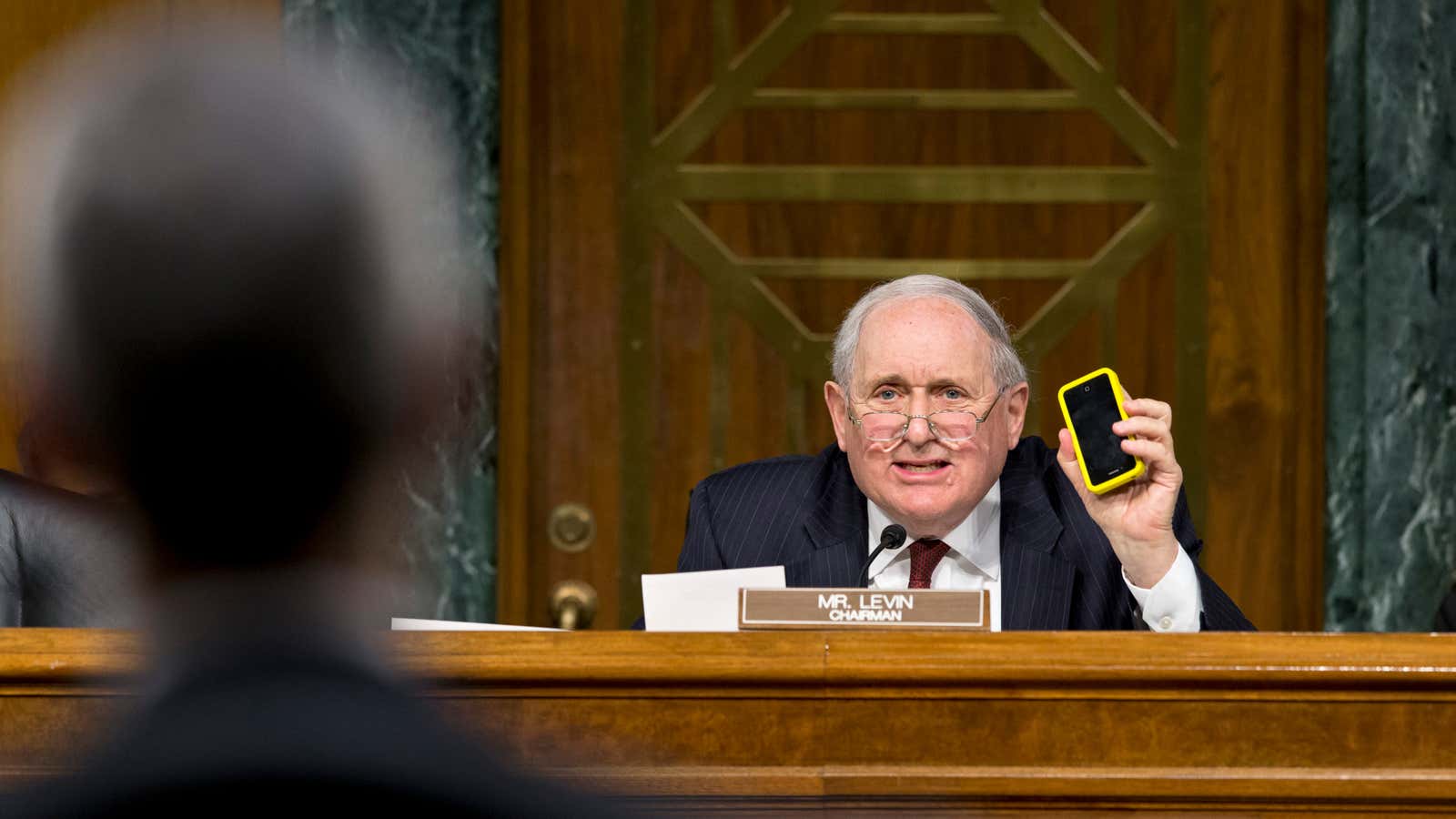The testimony by Tim Cook, CEO of Apple, on his company’s tax-avoiding habits has elicited mixed reactions. Some thought the company was being nailed to the cross; others thought the hearing added up to an Apple love-fest. But on the whole, the hearing wasn’t really about Apple’s tax shenanigans, since it isn’t really news that US multinationals do all kinds of tricky things to legally avoid paying corporate taxes.
The real purpose of this hearing was to solve a problem that goes far beyond Apple: the US is becoming a post-industrial economy whose most successful companies have more customers around the world than in the United States. Apple is a prime example because of its innovative business and powerful brand; until recently, it was America’s most valuable company. Here’s what the senator who lead the panel, Carl Levin, had to say:
More and more, intellectual property is the dominant source of value in the global economy. It is also highly mobile—unlike more tangible, physical assets, its value can be transferred around the globe, often with just a few keystrokes. The secret to Apple’s business success isn’t in the aluminum and steel and glass of my iPhone and other Apple products. Its profits depend on the ideas that bring those elements together in such an elegant package. That intangible genius is intellectual property that is nurtured and developed here in the United States. The key to offshore tax avoidance is transferring the profit-generating potential of that valuable intellectual property offshore so that the profits are directed not to the United States, but to an offshore tax haven.
As more US companies become increasingly transnational like Apple, the fear is that less of their earnings will end up in the hands of US shareholders and taxpayers. The idea is to update tax laws that were designed for a world in which companies employed mostly one nation’s workers, sold their goods to foreign companies and consumers, and paid taxes in their home countries. Now, with freer trade and capital flows, many US companies glean the bulk of their profits from selling ideas abroad, often through foreign companies they directly control. As we saw today, that makes the question of where they should pay taxes a big conundrum.
Cook says his company doesn’t use gimmicks to avoid corporate income tax, but he still squirmed when senators probed him about the deal undergirding Apple’s tax avoidance strategy: An “arms-length” agreement made by Apple executives in California to share its intellectual property with an Irish company—entirely controlled by Apple executives in California.
In Apple’s defense, it employs some 50,000 employees in the US, out of 75,000 around the world, and pays significant taxes, though nowhere near as much as it would if its accounting were less creative. Apple’s employee count also doesn’t include all the subcontracted factory workers at companies like FoxConn, which far outnumber its US workers by most estimates.
Of course, there’s value in breeding a knowledge economy that boasts innovative companies; in theory, ideas are worth more than widgets. But economists fear that pure knowledge economies promote inequality. They employ fewer low-skilled workers, which means the returns to capital accrue to a smaller, higher-skilled group of individuals. No wonder Levin, a Michigan representative, was driving the Apple investigation forward. His state is America’s auto manufacturing heartland. His constituents need better education and infrastructure to get a leg up in the globalized market, and that requires more taxes.
Apple, for all its independence, needs its home country, too, and not just for cultural ties and a place to call home (in other words, the $2 billion headquarters it’s constructing in Cupertino, California). Apple needs the US to enforce global intellectual property rights that protect its foreign sales.
There are plenty of ways to balance its US and global interests, whether by closing tax loopholes, fixing the whole corporate tax code or eliminating corporate taxes entirely in favor of much higher taxes on dividends and capital gains. The 21st century economy is fraught with many such challenges. Let’s hope the US Senate can tackle at least one of them.




